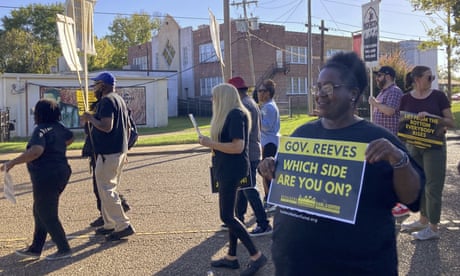- by foxnews
- 11 Mar 2025
Jackson water crisis: Mississippi accused of ‘intolerable’ racial discrimination
Jackson water crisis: Mississippi accused of ‘intolerable’ racial discrimination
- by theguardian
- 30 Sep 2022
- in news

The NAACP filed a federal complaint on Tuesday accusing Mississippi state officials of violating civil rights law by repeatedly diverting federal funds meant for ensuring safe drinking water away from the state's predominantly Black capital, Jackson, to smaller, white communities.
Their conduct amounted to racial discrimination and a devastating loss of access to drinking water for more than a month for residents in Jackson, where more than 80% of residents are Black and a quarter are in poverty.
"The result is persistently unsafe and unreliable drinking water and massive gaps in the access to safe drinking water that are intolerable in any modern society," Jackson residents allege in the complaint. "Nearly all of the residents of Jackson have watched brackish, dirty, impure, and undrinkable water trickle from their taps. At times, some have had no water at all."
The complaint, filed to the Environmental Protection Agency, amplifies pressure on officials in Mississippi and Jackson to address longstanding water infrastructure woes that recently forced Jackson to shut down its water supply in late August and maintain a boil water notice for weeks.
Last week, a group of Jackson residents also filed a federal class-action lawsuit against current and former city and state officials as well as an engineering firm seeking monetary damages for neglect by officials.
The NAACP's complaint to the EPA, which has 25 days to decide whether to investigate it, notes that Jackson's leaders have "repeatedly requested" aid from officials in the Republican-controlled state to "provide funding solutions". Instead, "Jackson's majority-Black population has been repeatedly ignored, spurned, or ridiculed," the complaint states.
In the last 25 years, the city has received federal funds toward addressing safe drinking water just three times. At the same time, since 2016, the city has imposed more than 750 notices for residents to boil their water, roughly 40% of which came in the last two years.
Derrick Johnson, president of the NAACP and a Jackson resident, blamed "racist funding policies" by Governor Tate Reeves, a Republican, and state officials that prevented critical and preventive infrastructure from being built. Johnson described in the complaint how he and his family often used boiled and bottled water even when the city wasn't under an advisory notice because he "cannot entrust his family's health to the crumbling water system".
The city, where more than 80% of residents are Black and a quarter are in poverty, depends on federal funding in part because it has suffered from a shrinking tax base since white residents fled the area in the decade following the integration of public schools. Since Mississippi is one of 49 states where the EPA allows the state to decide how water systems are funded, it leaves the authority over whether those funds are equally distributed up to the state. The EPA's inspector general announced in mid-September that it would investigate Jackson's "drinking water emergency", Politico reported.
The complaint notes that state officials have exacerbated the funding gap by repeatedly denying Jackson the ability to fund improvements to its drinking water system. In March 2021, when, after a previous water shutdown, Jackson's mayor, Chokwe Lumumba, requested $47m in emergency aid, and the state legislature approved just $3m .
"The people of Jackson, Mississippi, have lacked access to safe and reliable water for decades," the EPA administrator, Michael Regen, who visited the city on Monday and met with the city's mayor, said in a statement. "These conditions are unacceptable in the United States of America."
In the past decade, such conditions have become part of the disparate plight of communities of color in other cities like Flint, Michigan, and Newark, New Jersey, where lead-ridden water has plagued ailing water infrastructure systems. Abre' Conner, director of environmental and climate justice for the NAACP, said that the mishandling of Jackson's water crisis is part of a "longstanding history of mistreating, and neglecting Black communities, putting the lives of men, women, and children at risk.
"As our infrastructure continues to age and the effects of climate change worsen, we will continue to experience crises such as the one in Jackson, not only in Mississippi but in predominantly Black communities throughout the country," she said in a statement.
- by foxnews
- descember 09, 2016
High-end vacation resort bans children to achieve 'tranquil environment'
The Alila Marea Beach Resort, located in Encinitas, California, has announced that it's no longer accepting kids and is transitioning to an adults-only vacation spot.
read more


